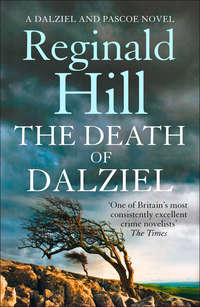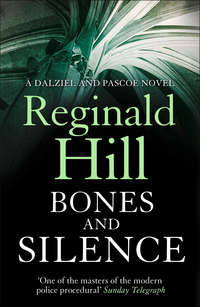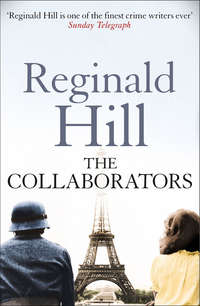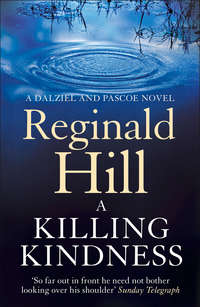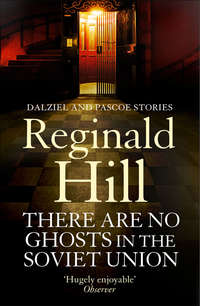
Полная версия
An April Shroud
Any corpse comes floating this way, I’ll say Hello sailor, and goodbye, avowed Dalziel and as an act of both symbol and necessity he descended to the water-lapped limit of the bridge, unzipped his flies and began to pee in the flood.
He had just finished when a noise made him look up. It was a long, creaking noise followed by a gentle splash. It came again from behind a wedge-shaped copse of beeches rising stoically from the water about fifty yards to his left. The mist seemed particularly thick here and he strained his eyes in an effort to penetrate the grey barrier. Then through the haze appeared a shape. The sound sequence was heard once more. And into full view glided a rowing-boat. Hastily Dalziel began to fasten his flies.
The boat pulled by him, the oarsman taking long, leisurely strokes. He had the look of an old countryman, weathered and fit, anything between fifty and a hundred but able to row for ever. In the bows, like a reverse figure-head, sat another old man of more determinate age, about seventy, with a profile fit for a Roman coin. But it wasn’t either of the men who held Dalziel’s eye.
Sitting on the thwart bench was a woman. She was clad all in black, even to a black veil over her face. Her head did not move as she passed, but Dalziel had a feeling that the eyes moved and saw him from behind the veil. So riveting was the tableau in the boat that Dalziel did not instantly take in the most macabre detail of all.
The rowing-boat was towing something behind it, a small flat-bottomed boat.
On it was a coffin.
It was unmistakably a coffin. The brass handles gleamed against the dark mahogany sides and three wreaths splashed white and green along the lid. Even the oarsman’s evident expertise could not keep the tow-rope perfectly taut and this strange piece of freight proceeded jerkily, its momentum almost bringing it up to the stern of the rowing-boat at the end of each stroke, as if it were in pursuit. But the woman never turned and Dalziel stood perfectly still, his attitude compounded of astonishment and the conventional deference of one who meets a cortège in the street.
But now a new sound came from behind the copse. Splashes again, but not the soft splashes of expertly wielded oars, and commingled with these were voices chattering and the occasional shout.
Another craft emerged through the mist but if the first could have been created by Lord Tennyson this one owed more to Jerome K. Jerome.
It was a large punt, the kind once used in duck-shooting with a stove-pipe gun mounted in the bows, rusty through neglect and non-use but still menacing for all that. Did they neglect the licence also? wondered Dalziel.
There were six people in the punt, which was perilously low in the water. The gunwale had no more than an inch of clearance at best, and water slopped over the sides with each thrust of the pole by the punter whom Dalziel recognized instantly as his companion in assault the previous evening. The breastless girl was seated in the punt alongside the fat young man, who still wore the same complacent expression. Opposite him was a boy of about sixteen, slim and pensive but with sufficient of the fat youth’s features to look as if he had just got out of him. And by the boy’s side was a young woman whose straight jet black hair and impassive, high-cheekboned face made Dalziel think of an Indian Maid (Pocahontas in the Board School history book rather than Little Red Wing in the rugby ballad, his only source-texts).
Finally, in the bows, resting nonchalantly against the gun, was a dark, ugly-looking man probably in his twenties, though it was difficult for Dalziel to be certain as the man’s black hair seemed to be in a state of insurrection and only the high ground of his nose and the valley of his eyes were putting up any real show of resistance.
Despite the impious exchange of views taking place between the girl and the youth with the pole, it was clear that this vessel was in convoy with the rowing-boat. The nearest any of them got to full mourning was the black turtle-neck sweater worn by the boy, but they had all made an effort. The fat youth wore a black armband around the sleeve of his tweed jacket, the hairy man had a black rosette pinned to his University of Love shirt, the Indian Maid wore a white blouse and slacks but looked as if she had been specially carved for a funeral, and the breastless girl had tied a length of black crape round her straw boater. Their only protection against the probable resumption of the rain consisted of two umbrellas and a parasol, carried at the slope by the men, except for the punter whose contribution to the solemnity of the occasion and his own dryness was a black plastic mackintosh under which he seemed to be dressed for cricket. Swimming would have been a sport more suitable, thought Dalziel, watching his efforts at propulsion. Basically, he had a not inelegant style, tossing the pole high and sliding it into the water with a casual flick of strong, supple wrists. The trouble was, deduced Dalziel, that the pole was then plunged two or three feet into sodden earth and his efforts to drag it out acted as a brake, so that the punt moved even more jerkily than the coffin.
The Indian Maid spotted Dalziel first and drew the attention of the others to him. The fat youth said something and they all laughed except the young boy. Dalziel was ready to admit that the sight of a portly gent apparently about to walk in to four feet of water was faintly comic, but none the less laughter in these circumstances struck him as a breach of decorum.
The rowing-boat was now out of sight and Dalziel watched the punt till it too disappeared. Then he walked back over the bridge and tested the depth of the water on the road. It was just within the limits of safety and he edged the car through it with great caution.
The road now rose again, following the skirts of the relatively high ground to his right which acted as a block to the flooded stream. From the crest of this small slope he could see for quite a way. The road dipped once more and about a hundred yards ahead it was flooded for a distance of thirty or forty feet. But presumably thereafter it rose steadily away from flood level, for just on the other side of the water stood a hearse and two funeral cars. The oarsman was in the water, pushing the coffin ashore where the top-hatted undertaker and his assistants were trying to grapple with it without getting their feet wet.
Dalziel halted and once more settled down to watch. Finally all was finished, the punt party reached shore safely, dividing themselves among the two cars, in the first of which the woman and the old man had presumably been seated all along, and the sad procession drove slowly away, leaving only the oarsman seated on the bows of his boat rolling a well-earned cigarette.
When the cortège was out of sight, Dalziel started his car once more and rolled gently down to the trough below, humming ‘One More River To Cross’. There was nothing like the sight of someone else’s funeral for making life look a little brighter.
Half-way through the trough, he suddenly realized this was much deeper than he had anticipated. At the same moment the engine coughed once and died. Dalziel tried one turn of the starter, then switched off.
Opening the window, he addressed the uninterested oarsman with all the charm and diplomacy he could muster.
‘Hey, you!’ he shouted. ‘Come and give us a push.’
The old boatman looked at him impassively for a moment before he slowly rose and approached. He was wearing gum-boots which came up to his knees but even so the water lapped perilously close to their tops.
When he reached the open window he stopped and looked at Dalziel enquiringly.
‘Yes?’ he said.
‘Don’t just stand there,’ said Dalziel. ‘Give us a push.’
‘I hadn’t come to push,’ said the man. ‘I’ve come to negotiate.’
He proved a hard bargainer, totally uninterested in payment by results. It wasn’t till he had folded the pound note Dalziel gave him into a one-inch square and thrust it deep into some safe apparently subcutaneous place that he began to push. The effort was in vain. Finally Dalziel dragged his own scene-of-crime gum-boots out of the chaos in the back of the car and joined him in the water. Slowly the car edged forward but once it reached the upslope its weight combined with the water resistance proved too much.
‘Sod it,’ said Dalziel.
They sat together on the rowing-boat and smoked. Dalziel had already had the one post-breakfast cigarette he allowed himself nowadays, but he felt the situation was special.
‘They’ll be coming back soon?’ he asked between puffs.
‘Half an hour,’ said the boatman. ‘Not long to put a man in the earth.’
‘Good,’ said Dalziel. ‘I’ll beg a lift from the undertaker. Who’re they burying?’
‘Mr Fielding,’ said the boatman.
‘Who’s he?’
‘Mrs Fielding’s husband,’ was the unhelpful reply.
‘Mrs Fielding was in the boat with you?’
Dalziel reached into his pocket, produced the emergency half-bottle he always carried with him in the car, took a long draught and offered it to his companion.
‘Ta,’ he said, and drank.
‘You didn’t make that in your garden shed,’ he added when he’d finished.
‘No. Are you Mrs Fielding’s …?’
He let the question hang.
‘I work up at the house. Most things that need done and can’t be done by lying around talking, I do.’
‘I see. Not a bad job if you play your cards right,’ said Dalziel with a knowing smirk. ‘Have another drink. That was Mrs Fielding’s family, was it?’
Why he should have been interested in anything but getting his car out of the flood and back into working order, he did not know. But time had to be passed and the habit of professional curiosity was as hard to change as the habits of smoking or drinking or taking three helpings of potatoes and steamed pudding.
‘Most on ’em. The old man’s her dad-in-law. Then there’s the three children.’
‘Which were they?’ interrupted Dalziel.
‘The two lads, Bertie, that’s the older one, him with the gut. Then there’s Nigel, the boy. And their sister, Louisa.’
‘The thin girl?’
‘You’ve got bloody good eyes, mister,’ said the man, taking another drink. ‘Must be this stuff.’
‘What about the others?’
‘Friends. Visitors,’ he grunted.
‘For the funeral?’
‘Oh no. They were here when he snuffed it. Not that it made much difference to ’em, mark you. Not to any on ’em. No. They just carried on.’
‘Oh, aye?’ said Dalziel, thinking that the trio he had observed in the Lady Hamilton the previous night had hardly comported themselves like grief-stricken mourners.
‘What made you take to the water?’ he asked. ‘Couldn’t the funeral cars get round to the house?’
‘It’d be a long way round. They checked first thing this morning after last night’s rain. Couldn’t afford the time. They’ve a lot of work on in this wet weather. So it was either the boats or wait. And they wanted shot of the coffin quick, you see.’
‘Well, I suppose it’s a bit deadly having it lying around the house,’ said Dalziel charitably.
‘Oh yes. Specially when it’s on the billiard table,’ said the other.
There was no answer to this and they finished their cigarettes in silence.
‘What did he die of, anyway?’ asked Dalziel, growing tired of the unrelenting lap of water.
‘Some say his heart stopped,’ said the boatman. ‘And some say he was short of breath.’
With difficulty Dalziel restrained himself from bellowing don’t you get funny with me!
‘What do you say?’ he asked instead.
‘Me? What should I know about it?’
He relapsed into a silence which plainly rejected breaking by any conventional social means. Dalziel walked along the water’s edge a short way and stood inspecting the punt gun. It had been a formidable weapon, but looked very long disused. While the metal had probably never been bright (why give the poor bloody ducks even a chance of a chance?), now it was rusty and dirty and a spider had spun a few hopeful strands across the muzzle.
It began to rain and after a few moments he returned to the shelter of the car. The boatman ignored his invitation to join him and remained where he was, even his cigarette appearing impervious to the downpour.
Nearly half an hour later the first of the funeral party returned. It was the blond youth, alone and on foot.
‘Shit!’ said Dalziel and clambered out of the car once more.
‘Hello,’ said the youth as he approached. ‘You’re stuck in the water?’
Dalziel smiled his congratulations.
‘Yes,’ he said. ‘Where’s the funeral cars?’
‘I was just telling Pappy, there’s a lot more water on the road about a quarter of a mile round the bend. They weren’t very happy about taking their shiny limousines through it on our way to the church and now they reckon it’s even deeper, so I was sent on to bring the boats a bit farther along.’
He grinned amiably, apparently unresentful of the task. Dalziel could guess who had elected him to it. Anyone who let a woman punch him on the nose without setting matters right between them very quickly was saddling himself up for a hag-ride.
The boatman was casting off already.
‘Hang on,’ said Dalziel. ‘I’ll get my stuff.’
The level of the water seemed perceptibly higher as he waded back to the car and unloaded his old cardboard suitcase. As he returned cautiously to the dry road, he saw to his chagrin that the rowing-boat was already on its way, leaving him to the uncertain mercies of the punt.
‘He’s in a hurry,’ he grunted as he placed his case carefully on one of the seats. The floor looked as if a halfpenny dropped from three feet would blast a hole through it.
‘A devoted retainer,’ said the other with enough of mockery in his voice to give Dalziel some hope for him. ‘I’m Charles Tillotson, by the way.’
‘Andrew Dalziel.’
‘Dee-Ell,’ echoed Tillotson. ‘Dee-Ell. Spelt D-A-L-?’
‘Z-I-E-L,’ finished Dalziel.
‘How impressive to be pronounced differently from the way you are spelt,’ said Tillotson, flourishing the pole. ‘It’s sort of a test for people, isn’t it? Perhaps I should drop the ILL, Totson. What do you think?’
‘How about Tit?’ said Dalziel. ‘Are we going to move or shall we sit here getting wet all bloody day?’
Gingerly he seated himself next to his case and closed his eyes as Tillotson thrust off stylishly, got the pole stuck instantly and almost dislodged himself in his efforts to pull it out.
By the time they had followed the bend of the road and got the rowing-boat back in sight, it had reached the new landing-point and the rest of the party were already embarking. To Dalziel’s dismay the funeral car then began to move off.
‘Hey!’ he bellowed, drawing the attention of the mourners and frightening a small batch of teal who were exploring their new-found territory. But the black limousine purred disdainfully on its way and was soon out of sight.
‘Sod the bastard!’ said Dalziel savagely.
‘Pappy must have forgotten,’ surmised Tillotson.
‘Sod him too.’
Some explanation of his presence must have been required and given on the rowing-boat for when they drew level, no one showed much curiosity about him.
The woman, Mrs Fielding he presumed, was sitting in the stern with the old man. The stout youth had taken an oar and was seated alongside Pappy who returned Dalziel’s accusing gaze blankly. The boy was in the bows, curled up like the Copenhagen mermaid. And the other three were crowded in the flat-bottomed boat lately occupied by the coffin.
‘I think some of you must go back with Charley,’ said Mrs Fielding in a firm, rather deep voice. Her veil was lifted now, revealing a strong almost masculine face which grief and hard weather had only been able to sting to a healthy flush.
‘Oh no,’ protested the thin girl, Louisa. ‘Bertie’s rowing too, and we can’t weigh much more than a coffin.’
‘Nevertheless,’ insisted her mother.
‘I’ll go,’ said the dark hairy man who was taking some shots of the floods with an expensive-looking camera. He stood up and stepped into the punt with the ungainly ease of a sailor.
This seemed to satisfy Mrs Fielding’s distribution problems for the moment. She now addressed Dalziel.
‘I’m sorry the car went before Pappy could speak with the driver. If you’d care to come to the house, you can phone from there. Alternatively, we can leave you here and phone on your behalf.’
The man called Pappy started rowing and Bertie quickly picked up the stroke as Dalziel considered the alternatives. The rain was coming down harder. The occupants of the rowing-boat were concealed almost completely by a carapace of umbrellas which brought to mind the shield-wall of a Viking ship.
Dalziel turned to Tillotson.
‘Follow that boat,’ he said.
3
A Nourishing Broth
The teal had dropped back to the surface and followed at a safe distance.
‘I had a friend,’ said the ugly man in a pseudo-American accent, ‘got badly hurt trying to screw a duck.’
‘Oh, yes?’
‘Yeah. He had this thing, you know, about having relationships with the whole of creation. But the duck didn’t see it that way. Took half his nose off. After that he changed his scheme, went for the spiritual communion thing more, you know.’
‘Just as well perhaps,’ said Dalziel. ‘He might have had trouble with ants.’
The other laughed approvingly.
‘That’s true, man.’
He thinks he’s tested me, thought Dalziel. Now I’ve passed his little shock test, he’ll try to patronize me.
‘Charley there, the boy with the wooden whanger, now he goes in more for this kind of kick.’
He squatted behind the punt gun and made firing noises more appropriate to a howitzer.
‘No, Hank, you’ve got it wrong,’ protested Tillotson amiably. ‘I like a bit of sport, that’s all. I say, these floods are rather jolly though. I bet a lot of birds will come back. It must have been fine fowling country, this, before they drained it.’
‘See what I mean?’ said the other. ‘He’s just aching to get this old phallic symbol jerking off again.’
At last Dalziel had penetrated through the pseudo-mid-Atlantic flip speech style to a couple of recognizable vowels. He liked to know where he was with people and basic information about background was a good place to start. It gave him something to occupy his mind, to keep out the greyness which threatened to seep in whenever he relaxed.
‘Not many ducks in Liverpool,’ he said. ‘My name’s Dalziel. Who’re you?’
The dark man looked at him assessingly before replying, ‘Hank Uniff.’
Dalziel laughed, a short sharp offensive bark which acknowledged that there hadn’t been much chance of his interlocutor being called Jim Smith or Bill Jones.
‘Pleased to meet you,’ he said. ‘How was the funeral?’
‘Full of images, man,’ said Uniff. ‘Hey, Charley, great funeral, huh? I mean, when they dropped the coffin in the hole, well, it was just about waterlogged. Cheerist, what a splash!’
‘Yes,’ admitted Tillotson as he passed them in practice of his new technique which involved thrusting the pole into the water off the bows and walking the whole length of the punt. It was inevitable, thought Dalziel, that one so obviously born a victim would sooner or later step over the side.
‘Yes,’ repeated Tillotson, ‘it was rather like a burial at sea. Full fathom five, Tom Bowling, all that. Did you get some good pictures, Hank?’
‘I shot off a whole roll,’ replied Uniff. ‘But did I get the light right? It wasn’t easy to judge and that creepy preacher man didn’t help by complaining.’
He cradled his camera protectively as if an attempt were being made to wrest it from his hands.
‘Didn’t Mrs Fielding object?’ queried Dalziel.
‘Bonnie? Hell, no. I mean, why, man?’
‘Hank’s an artist,’ explained Tillotson, passing them again at a smart trot. His new technique was certainly moving the punt along much faster, but at the expense of direction if one assumed that the rowing-boat was taking the shortest route home. It was now almost out of sight and several points to the nor’-east.
Dalziel pulled his coat collar more tightly round his neck and resisted the temptation to take charge of the vessel. He was the super-cargo, not the captain. But something of his feelings must have shown to Uniff who grinned maliciously at his discomfiture and began to whistle ‘The Skye Boat Song’.
‘What kind of artist are you, Mr Uniff?’ asked Dalziel.
‘What kinds of artist are there, man?’ replied Uniff.
‘Well,’ replied Dalziel, irritated, ‘there’s con-artists, and there’s shit-artists, and there’s …’
But his catalogue of abuse was interrupted by the forecast disaster. Tillotson drove the punt forward into a half-submerged hedge, the bows rose in the air, Tillotson screamed and went over the side, Uniff and Dalziel fell together in a tangled heap from which Dalziel recovered just in time to see his suitcase slowly toppling into the water.
Furious, he rose and put his huge hand into the face of Tillotson who was trying to clamber back on board.
‘My case!’ he yelled. ‘Get my bloody case!’
Recognizing that this was an essential condition of readmittance, Tillotson pursued the case which had floated only a few feet but was sinking fast. Dalziel took it out of his hands and tried to drain it as, unassisted, the blond youth dragged himself on board, his exertions freeing the punt from the hedge. Uniff all the while took pictures, including one of the pole which for once had not become embedded in the mud but was floating away at a distance of some twenty feet.
Dalziel banged his case down with a force that nearly brought on a new disaster.
‘Mr Dalziel, sir,’ said Uniff, still photographing. ‘By the ancient laws of the sea, I elect you captain. What now, man? Are you going to run a tight ship?’
Dalziel swallowed the anger which he realized would not be particularly productive at the present time.
‘I might just marry you to this goon,’ he said, ‘and see if you could fuck some sense into him.’
Instead he swung his wellingtoned foot at the narrow planks which formed the cross seat and his fierce onslaught quickly loosened one sufficiently for it to be torn free. Then, using this as a paddle, he sent the punt in pursuit of the pole.
Uniff now put away his camera and rescued the pole from the water. Tillotson with the natural gallantry of the aristocrat offered to resume his post, but Dalziel with the equally natural bluntness of the peasant told him to keep his hands on his knees and his bum on the floor and not to move on peril of his manhood.
Uniff stepped to the back of the punt and with a vigorous driving stroke, which more than made up in efficiency what it lost to Tillotson’s in style, he sent the punt scudding over the surface at such a rate that they were only fifty yards behind the rowing-boat as it reached the farther boundary of the water.
There was a lake here, Dalziel surmised, which had overflowed its banks and joined its waters with those of the stream running parallel to the road more than a quarter of a mile behind them. A small landing-stage, waterlogged by the rise in the level of the lake, led to some steps set into a steep sloping garden which rose to a substantial nineteenth-century house in a state of dilapidation not wholly explained even by three days of incessant rain. It was the house he had noticed earlier from the bridge to nowhere and, though close to it lost most of its fairy-tale-castle quality, it still had a solid, fortified look about it.
The other party had disappeared into the house by the time the punt reached the landing-stage and Dalziel did not stand upon ceremony but, using Tillotson’s head as a support, he stepped ashore, strode grimly up the garden steps and entered the house without waiting for an invitation. Now he paused, not because of any late revivings of social courtesy but because it was far from clear to him where everyone had disappeared to.


